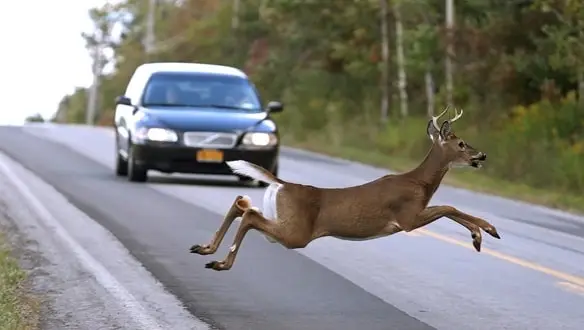No, in most states, it is not explicitly illegal to hit a deer and drive off. However, there are situations where leaving the scene without taking proper steps can lead to legal or ethical complications. Understanding the legal responsibilities and practical considerations following a deer collision is crucial for drivers.
Legal Responsibilities After Hitting a Deer
State-Specific Laws
In the United States, hitting a deer is generally considered an accident involving wildlife, and no state explicitly criminalizes driving away after such an incident. However, many states have laws requiring drivers to report accidents if they result in:
- Personal injury: If the collision caused injuries to you, passengers, or others, reporting is mandatory.
- Significant property damage: Most states have thresholds for reporting property damage, ranging from $500 to $1,500. If hitting a deer results in damage exceeding the threshold, you are legally required to report the incident.
- Road hazards: If the deer carcass remains on the road and creates a hazard for other motorists, notifying local authorities is typically required.
For example:
- In Michigan, it is required to report the accident to law enforcement if the deer carcass is obstructing traffic.
- In Vermont, collisions with large animals like deer or moose must be reported to authorities, especially if the animal is left injured or deceased on public property.
Safety and Ethical Obligations
Public Safety
Even if it’s not illegal to drive off, leaving an injured or deceased deer on the road could endanger other motorists. Reporting the incident ensures that the carcass or injured animal is removed, preventing further accidents.
Animal Welfare
If the deer is injured, ethical considerations come into play. Contacting local wildlife or animal control authorities allows the animal to be humanely handled. Ignoring an injured deer could result in prolonged suffering.
What to Do After Hitting a Deer
- Ensure Your Safety:
- Pull over to a safe location away from traffic.
- Turn on hazard lights to alert other drivers.
- Assess the Situation:
- Check for injuries to yourself or passengers.
- Determine whether the deer is obstructing traffic or creating a hazard.
- Avoid Contact with the Deer:
- Injured deer can act unpredictably and may cause harm if approached.
- Document the Scene:
- Take photos of your vehicle’s damage and the location. This is helpful for insurance claims.
- Report If Necessary:
- Contact local law enforcement or animal control if the deer poses a road hazard or significant damage has occurred.
- Inform Your Insurance Company:
- Comprehensive car insurance often covers animal-related accidents. Reporting promptly ensures your claim is processed efficiently.
Insurance Considerations
Collisions with deer are typically covered under comprehensive insurance policies, not collision coverage. Ensure you understand the terms of your policy, including deductibles and coverage limits. Documentation, such as photos and police reports, can expedite the claims process.
Preventing Deer Collisions
- Stay Alert During Peak Times:
- Deer are most active at dawn and dusk, especially during fall and early winter.
- Slow Down in Deer Zones:
- Pay attention to deer crossing signs and reduce speed in rural or wooded areas.
- Use High Beams:
- When driving at night, use high beams to spot deer earlier, but be cautious of blinding oncoming traffic.
- Don’t Swerve:
- If a collision seems inevitable, brake firmly and stay in your lane. Swerving can cause loss of control or secondary collisions.
Most Common FAQs Related to Hitting a Deer
1. Do I have to report hitting a deer to the police?
- Not always. Reporting is mandatory only if the accident results in personal injury, significant property damage, or creates a traffic hazard.
2. Will my insurance rates go up if I hit a deer?
- Comprehensive claims typically don’t result in premium increases, but it depends on your insurer’s policies.
3. Can I keep the deer if I hit it?
- Some states allow you to claim the deer meat, but you must report the incident and obtain a permit. States like Pennsylvania and Michigan have specific roadkill laws.
4. Is it safe to approach an injured deer?
- No. Injured deer can be dangerous and should only be handled by wildlife professionals.
5. What if hitting a deer damages someone else’s property?
- You are responsible for reporting the incident and covering damages to property, such as fences or parked cars, through liability insurance.
Conclusion
While it’s not illegal in most states to drive off after hitting a deer, ethical considerations, public safety, and potential reporting requirements make it advisable to stop and assess the situation. Taking appropriate steps not only ensures compliance with state laws but also upholds safety for yourself and other motorists.


